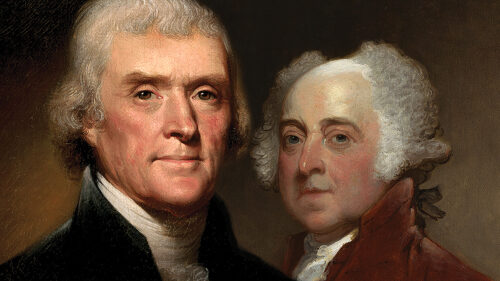
Exhibits
From Bullets to Ballots: The Election of 1800 and the First Peaceful Transfer of Political Power - Bibliography
Primary Sources
Below are the editions of works that are the most readily available and also the most reliable.
- Colonies to Nation, 1763-1789: A Documentary History of the American Revolution, edited by Jack P. Greene
This collection of pamphlets, official government statements, and personal letters from the revolutionary period shows how the colonists pressed for independence from English rule and finally established the union. - Records of the Federal Convention (3 vols.), edited by Max Farrand
Farrand’s Records gathers into three volumes all the records written by participants of the Constitutional Convention of 1787. The records appear in various abridged versions. - The Federalist Papers, edited by Clinton Rossiter and Charles Kesler
The Federalist, or The Federalist Papers, consists of a series of newspaper essays written in 1787-88 by James Madison, Alexander Hamilton, and John Jay advocating New York’s ratification of the Constitution. It remains the most thoughtful and thorough study of the Constitution ever written. The most essential essays to read are numbers 1, 9, 10, 11, 39, 49, 51, 70, and 78. - Debate on the Constitution (2 vols.), edited by Bernard Bailyn
Speeches, newspaper articles, pamphlets and letters from 1787 and 1788 show the energy and elegance of the debate over ratification of the Constitution. - George Washington: A Collection, edited by W. B. Allen
- Thomas Jefferson: Writings: Autobiography, Notes on the State of Virginia, Public and Private Papers, Addresses, Letters, edited by Merrill D. Peterson
- James Madison: Writings, edited by Jack Rakove
- American Political Writing During the Founding Era, 1760-1805, edited by Charles Hyneman and Donald Lutz
This comprehensive and useful two-volume set contains essays, speeches, and pamphlets from little-known as well as famous leaders of the founding era. - The Founders’ Constitution (5 vols.), edited by Philip B. Kurland and Ralph Lerner
This massive set examines the political arguments in forming the Constitution through judicious editing of primary source material. On CD-ROM.
Secondary Sources
A selection of the leading historical studies, one-volume biographies, and other readily available works about the first decades of America and the savior of the principles of the Declaration of Independence and the Constitution, Abraham Lincoln. More detailed information may be found on www.founding.com.
- The Birth of the Republic, 1763-1789, by Edmund Morgan
The best brief history of this period. - History of the United States of America During the Administrations of Thomas Jefferson and James Madison, by Henry Adams
This Library of America edition is the standard history of this period, written with verve and wit by President John Adams’ great-grandson. - Vindicating the Founders: Race, Sex, Class, and Justice in the Origins of America, by Thomas G. West
This groundbreaking book refutes directly the pernicious modern school of scholarship that portrays America’s founders as racist, sexist, and elitist hypocrites. - On Faith and Free Government, edited by Daniel C. Palm
These essays and documents explain the Founders’ view that religion is compatible with, and even necessary to liberal democracy. - Republics Ancient and Modern (3 vols.), by Paul A. Rahe
The American Founding is impossible to understand apart from its roots in ancient and modern political philosophy. Massive notes and bibliography. - Founding Father: Rediscovering George Washington, by Richard Brookhiser
An elegant brief study of Washington, modeled after Plutarch’s Lives. - A Sacred Union of Citizens, by Matthew Spalding and Patrick Garrity
A thorough and thoughtful treatment of George Washington’s Farewell Address and its influence throughout American history. - Thomas Jefferson and the New Nation, by Merrill D. Peterson
- The Sacred Fire of Liberty: James Madison and the Founding of the Federal Republic, by Lance Banning
- Alexander Hamilton: A Biography, by Forrest McDonald
- Abraham Lincoln, Lord Charnwood, introduction by Peter Schramm.
Originally published in 1917, this remains the best one-volume biography. - Alexis de Tocqueville, Democracy in America, edited by Harvey C. Mansfield and Delba Winthrop
The French political philosopher and statesman Alexis de Tocqueville produced what remains a profound commentary on the American character. Written in the 1830s, this very readable work appears in several paperback editions. This more recent edition by Mansfield and Winthrop, however, is the most authoritative. - Abraham Lincoln: His Speeches and Writings, edited by Roy P. Basler.
This is the best one-volume edition of his works. - Abraham Lincoln, Writings, edited by Don E. Fehrenbacher (2 vols.)
- Collected Works, edited by Roy P. Basler (9 vols.)
- Lincoln-Douglas Debates, edited by Robert W. Johannsen
For splendor and profundity, no commentator on the nation’s founding compares with Abraham Lincoln. See especially his Perpetuation Address (January 27, 1838), Dred Scott speech (June 26, 1857), Cooper Union Address (February 27, 1860), First Inaugural (March 4, 1861), Gettysburg Address (November 19, 1863), and Second Inaugural (March 4, 1865). - Crisis of the House Divided: An Interpretation of the Issues in the Lincoln-Douglas Debates, by Harry V. Jaffa
This indispensable work explains the issues central to the Lincoln-Douglas debates and the clash between popular sovereignty and natural rights that was at the center of the debate over slavery. - A New Birth of Freedom: Abraham Lincoln and the Coming of the Civil War, by Harry V. Jaffa
Forty years in the making, this is Jaffa’s sequel to Crisis. Here he skillfully illuminates Lincoln’s understanding of self-government, equality and statesmanship, setting them in the context of world history.
